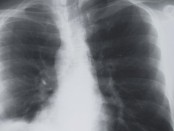Lung Cancer Rates in Women up 35% in Wales
The number of women in Wales being diagnosed with lung cancer is “rapidly increasing” and has seen a 35% rise in the last decade, according to a report. It is now the second most common cancer for women in Wales – and third highest rate of the disease in 40 EU countries. Doctors say the vast majority of cases are preventable, and have called for further controls on tobacco sales. Figures published on Tuesday also show lung cancer in Welsh men has decreased by 3% over the same period. “Lung cancer is the most common cancer worldwide and is the commonest cancer leading to death in the EU,” said Dr Dyfed Wyn Huws from the Welsh Cancer Intelligence and Surveillance Unit (WCISU) at Public Health [More…]





